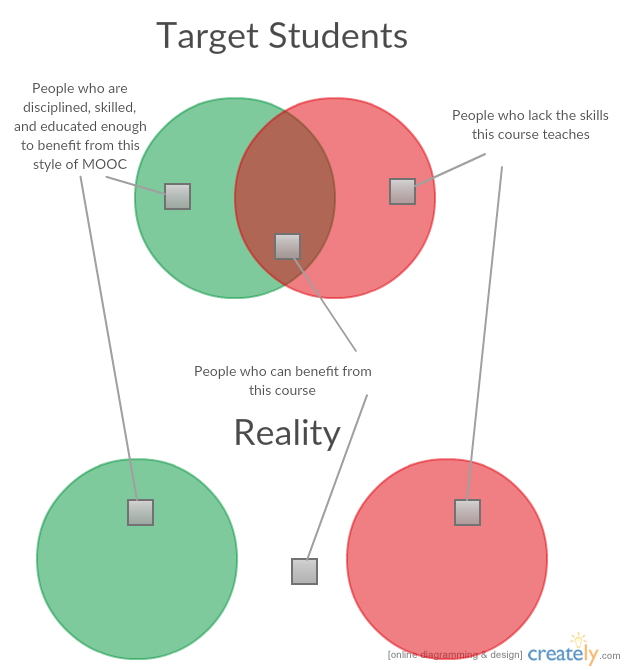I’ve done a lot of MOOCs in the last few weeks. The vast majority of them rate “Meh” on the scale from “Ack!” to “HOLYCANIBITZ!” At the two extremes, I feel like I should say a bit more about them, but here are a bunch of the Meh courses that are so forgettable that I don’t have much to comment on.
Course Title: English: Skills for Learning
Provider: The Open University via OpenLearn
Price: Free
Level: Introductory
Effort: Self-paced, 24 hours, estimated 8 weeks
Prerequisites: None
Completion awards: Statement of Participation, Open Badge
About the course:
This was a fair mix of instruction and practical exercises. The information in this course is a very small subset of the information in The Good Study Guide, which I’ve previously mentioned. The actual time on the course for me (taking the practical exercises very seriously) was about 6 hours. If I didn’t have the Good Study Guide, it may have been a nice reference before beginning higher education.
Course title: Information Security
Provider: The Open University via OpenLearn
Price: Free
Level: Advanced
Effort: Self-paced, 10 hours
Prerequisites: None
Completion awards: Statement of Participation
About the course:
This course is listed as an advanced course, but I can’t for the life of me figure out how. Really, this could have been a much shorter MOOC than its realistic 90 minutes (most of which was spent choosing and listening to a podcast): CIA stands for Confidentiality, Integrity, and Accessibility, and listen to information security podcasts. Job done.
Course Title: Good Brain, Bad Brain: Basics
Provider: University of Birmingham via FutureLearn
Price: Free
Level: Introductory
Effort: 9 hours over 3 weeks, commencing on set date
Prerequisites: None
Completion awards: Certificate of Achievement + Transcript (£59 + shipping) for completing 90% of course content, attempting all tests, with score of 70%, or Statement of Participation (£39 + shipping) for completing 50% of course content and attempting all tests
About the course:
Well, as the title of the course implies, this is very basic. But it’s also very good. It’s a concise and informative description of many of the functions and attributes of the brain. And while very interesting, I don’t think my heart would be in it to complete the three-part series this course is a part of. Also, I don’t think I could take it listening to those pronunciations and reading those spelling choices again. It felt like every scientific word was deliberately pronounced wrong and spelled the least usual way.
Course Title: Introduction to Cyber Security
Provider: The Open University via FutureLearn
Price: Free
Level: Introductory
Effort: 24 hours over 8 weeks, commencing on set date
Prerequisites: None
Completion awards: Statement of Participation (£34 + shipping) for completing 50% of course content and attempting all tests
About the course:
This seems like it would be a good course for someone to start considering cyber-security. As these concepts are a part of my job, none of the information in it was new, and I completed the 8 week course in about three days, so maybe 10 hours or so. I like that this course doesn’t shy away from technical descriptions of digital encryption techniques, though it doesn’t describe any actual computational mechanism for any of the concepts. As it was most definitely not directed at me, I can only say that it seems good, and has all the points and more of the things I’d want to teach someone for a primer on the subject.
It needs to re-think its active learning portions, though. Though this is an introductory course and is limited to digital information rather than general information, it’s far more useful to all learners than the “advanced” course on OpenLearn above.
